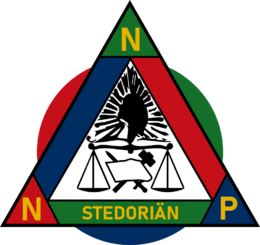National Assembly of Popular Power (Stedoria): Difference between revisions
mNo edit summary |
mNo edit summary |
||
| (5 intermediate revisions by the same user not shown) | |||
| Line 3: | Line 3: | ||
{{Infobox legislature | {{Infobox legislature | ||
| name = National Assembly of Popular Power | | name = National Assembly of Popular Power | ||
| native_name = Netalasam | | native_name = Netalasam Pöpanämäda<br/>Natsyonalavërsemlëng dër Volkamakht | ||
| native_name_lang = | | native_name_lang = | ||
| transcription_name = | | transcription_name = | ||
| Line 61: | Line 61: | ||
**{{colorbox|#FFC90E|border=darkgray}} [[United Development Party (Stedoria)|DPB]] (17) | **{{colorbox|#FFC90E|border=darkgray}} [[United Development Party (Stedoria)|DPB]] (17) | ||
**{{colorbox|#0076AE|border=darkgray}} [[Liberal Party (Stedoria)|PVLL]] (10) | **{{colorbox|#0076AE|border=darkgray}} [[Liberal Party (Stedoria)|PVLL]] (10) | ||
*{{colorbox|#793FA9|border=darkgray}} [[ | *{{colorbox|#793FA9|border=darkgray}} [[Movement 13 (Stedoria)|M13]] (17) | ||
*{{colorbox|#FF8000|border=darkgray}} [[Party of the Paysan People|PPP]] (5) | *{{colorbox|#FF8000|border=darkgray}} [[Party of the Paysan People|PPP]] (5) | ||
| committees2 = | | committees2 = | ||
| Line 114: | Line 114: | ||
| footnotes = | | footnotes = | ||
}} | }} | ||
The National Assembly of Popular Power (Stedorian: ''Netalasam | The National Assembly of Popular Power (Stedorian: ''Netalasam Pöpanämäda'') is the {{wp|legislature|legislative branch}} of the federal government of [[Stedoria]]. The National Assembly has supreme legislative authority over Stedoria, and has the power to overrule any of Stedoria's provincial or territorial (with the exception of Paysania) legislature's decisions with the approval of the Chief Consul, though this rarely happens. | ||
Its composition is unicameral, and consists of a 175-seat parliament. The National Assembly is led by the Speaker of the Assembly, who is forbidden from membership within a political party. The speaker is elected by the chamber, and is expected to act with neutrality and impartialness. | Its composition is unicameral, and consists of a 175-seat parliament. The National Assembly is led by the Speaker of the Assembly, who is forbidden from membership within a political party. The speaker is elected by the chamber, and is expected to act with neutrality and impartialness. | ||
Latest revision as of 18:44, 4 July 2024
This article is incomplete because it is pending further input from participants, or it is a work-in-progress by one author. Please comment on this article's talk page to share your input, comments and questions. Note: To contribute to this article, you may need to seek help from the author(s) of this page. |
National Assembly of Popular Power Netalasam Pöpanämäda Natsyonalavërsemlëng dër Volkamakht | |
|---|---|
| 4th National Assembly of Popular Power | |
 Emblem of the National Assembly of Popular Power | |
| Type | |
| Type | |
| Houses | National Assembly of Popular Power |
| History | |
| Founded | 16 March 2010 |
| Leadership | |
Chief Consul | |
Speaker of the National Assembly | Jon Mülan |
| Seats | 175 |
 | |
National Assembly of Popular Power political groups | Government (113)
Opposition (65) |
| Elections | |
National Assembly of Popular Power voting system | D'Hondt method |
National Assembly of Popular Power last election | 16 March 2022 |
National Assembly of Popular Power next election | On or before 16 March 2026 |
The National Assembly of Popular Power (Stedorian: Netalasam Pöpanämäda) is the legislative branch of the federal government of Stedoria. The National Assembly has supreme legislative authority over Stedoria, and has the power to overrule any of Stedoria's provincial or territorial (with the exception of Paysania) legislature's decisions with the approval of the Chief Consul, though this rarely happens.
Its composition is unicameral, and consists of a 175-seat parliament. The National Assembly is led by the Speaker of the Assembly, who is forbidden from membership within a political party. The speaker is elected by the chamber, and is expected to act with neutrality and impartialness.
The Assembly, whose members are elected to four-year terms, are elected by an electoral district system, in which each deputy must win in their own riding to be represented.